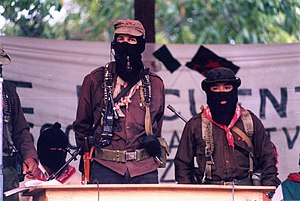Chiapas conflict
| Chiapas conflict | |||||||||
|---|---|---|---|---|---|---|---|---|---|
 Subcommandante Marcos orating before fellow zapatistas |
|||||||||
|
|||||||||
| Belligerents | |||||||||
|
|
|
||||||||
| Commanders and leaders | |||||||||
|
|
|
||||||||
| Casualties and losses | |||||||||
| Military dead: 3 | Military dead: 51 | ||||||||
|
Civilians dead: 46+ |
|||||||||
Civilians dead: 46+
The Chiapas conflict (Spanish: Conflicto de Chiapas) refers to the 1994 Zapatista Uprising and its aftermath, as well as the general tensions between the indigenous peoples and subsistence farmers in the Mexican state of Chiapas, having its roots in the 1990s and 1980s.
The Zapatista uprising started in January 1994, lasting for less than two weeks, before being crushed by the government. Negotiations between the government and Zapatistas allowed agreements to be signed as part of peace negotiations, but these agreements were not complied with in the following years and the peace process stagnated. This resulted in an increasing division between communities with ties to the government and communities that sympathized with the Zapatistas. Social tensions, armed conflict and para-military incidents increased, culminating in the killing of 45 people in the village of Acteal in 1997 by para-militaries. Though at a low level, rebel activity continues and violence occasionally erupts between Zapatista supporters and anti-Zapatista militias along with the government. The last related incident occurred in 2014, with a Zapatista-affiliated teacher killed and 15 more wounded in Chiapas.
Historically Mexico is characterized as a country founded upon a Spanish elite system which featured limpieza de sangre or cleanliness of blood, a legal system characterized by feudal land tenure, and an economic system which featured an exploitative system which furthered social inequalities. The issue over land rights and social rights dates back to the Mexican War of Independence when the colonial Mexican-born people of Spanish origin known as the Criollos rebelled against the Spanish crown as a means of protecting and furthering their own land and social rights against foreign Spanish authorities.
...
Wikipedia
